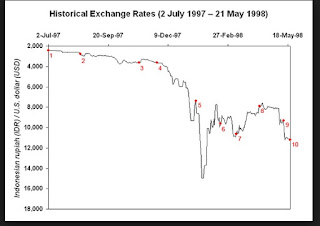A Journey In and Out of International Journalism -- Chapter 6 -- Fixers and Fixing
Crisis for Some = New Opportunities for Journalists (and other Merchants of Despair)
While I was still in Jakarta in 1998 (yes, it's been a while), working the graveyard shift at the SCTV television station and freelancing for different media, international, web and local, a dual economic crisis and student-led social upheaval were taking place.
Suits from the International Monetary Fund were in town every other day to try to save the increasingly corrupt and tight-circled Suharto regime, but eventually bad decisions, and the rotten core, both economically and militarily, led to a run on banks, the steep devaluation of the rupiah, and the counter-productive repression of growing protests. The devaluation meant my salary of about 100 dollars a night was cut to ten dollars a night, which wasn't so great anymore.
Becoming a Fixer
Desperate for cash, I started work as a fixer and got some of my best education. My first gig was not so good, with a photographer from Paris Match, who felt he already knew everything, which made working with him somewhat unpleasant. Take me to the place where the students were shot, he would say …. There needs to be traces of blood though … Why is there so much traffic here, must be an accident up ahead. This dictator (Suharto) will never bow down to students and a small economic problem, you'll see ….
My second gig, which I also got through contacts at the French embassy, was much better. It was with a former colleague from Radio France Internationale super correspondent Bruno Minas. He was a radio journalist sent from one boiling place of the earth to another, when he wasn't on his regular beat in West Africa. First he wanted to go to some of the poorest parts of Jakarta, but soon he realized, along the train tracks, the really poor were too crazy or too desperate to really care or know anything on what was going on. Then we went to the parliament building, where long-haired students were trying to take over the inside of the building, and for now, were outside, occupying the grounds. They displayed tee-shirts and signs against corruption, collusion and nepotism.
Learning by Helping and Watching
Minas showed me how being in the middle of the action was the key, at least for a while, and that the sounds and emotions were what were needed to create a story, interweaved with some of the latest salient news, appropriate background and selected analysis of what was going on. Minas pointed his microphone straight into the fountain where students were splashing around, straight into the drums the students played, dancing along to make the students comfortable and empowered by his presence. I translated from half English, half Bahassa Indonesia into French as he interviewed the students, as they were about to actually lead the overthrow of a corrupt despot, in an almost bloodless handover.
Crisp Dollars
At the end of three hours of work, which didn't feel like work at all, but more like essential training, and before Minas went back to file from his hotel room, he handed me a crisp 100 dollar bill. He would later return to the parliament grounds, while I went to my television job. Over the next few weeks, I would work nights for Indonesian television and days for so-called big foots, international journalists, some of them vultures, some of them professionals, swooping in on big stories.
Better, But in More Danger
Fixers as they are called often times have much more knowledge and even reporting instincts than the foreign journalists they work for. The dangers are often much greater for them. Later I once had a colleague at the Voice of America, another correspondent, who would at one point return to Iraq to pay her fixer/translator a bonus, but she was being followed, and then he was assassinated.
From Wacky to Unforgettable
I once wrote on this blog a chapter called Fixers Not Always from a Paradise, concerning some of my own wacky experiences from Africa, this time in the role of the correspondent, as the fixer / foreign journalist relationship is obviously quite an interesting one. I've seen many journalists in Africa robbed by their fixer, or duped into telling just one side of the story. It's all part of the reporting experience. But fixers are essentially what makes most of the best international reporting possible. I named my first born after one of the best fixers I have ever worked with Maseco Conde, from Guinea. He died when my wife was pregnant, apparently of malaria. RIP Maseco and long live my son, who inspired me to get out of the rat race of international journalism, but in whom I remember all the excitement it was.







Comments
Post a Comment